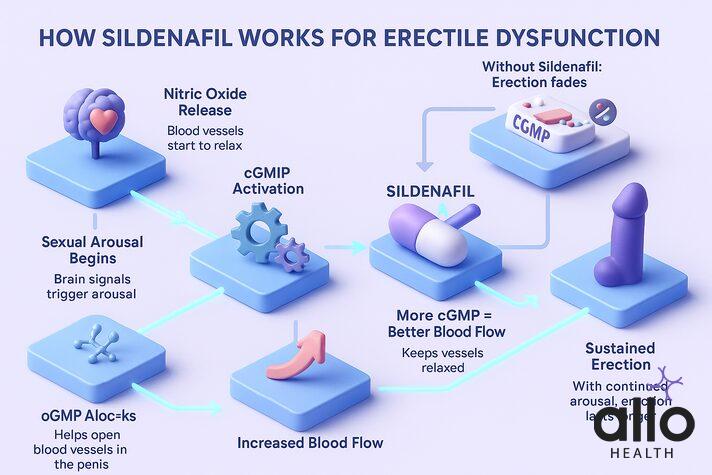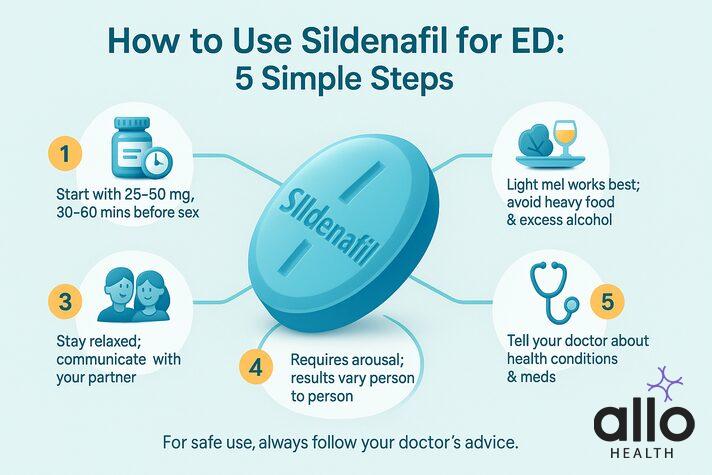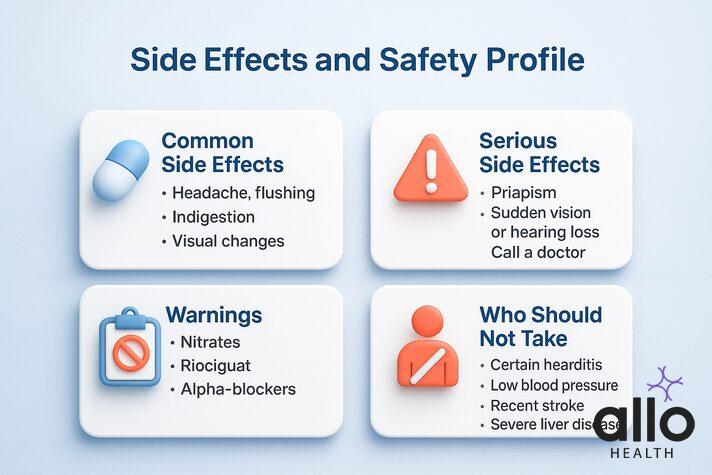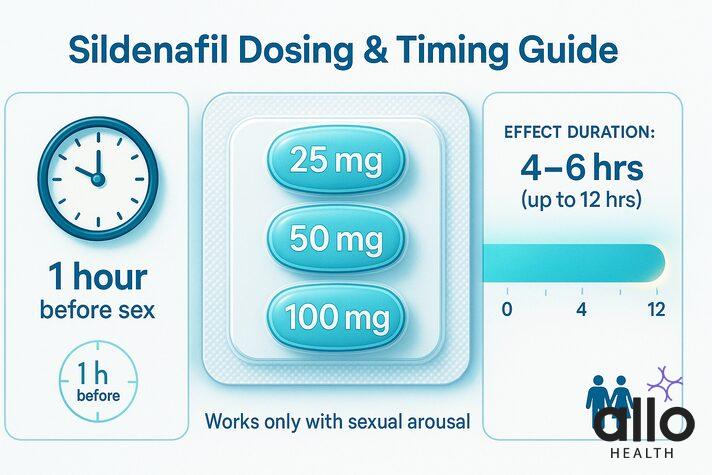Sildenafil for Erectile Dysfunction: How It Works and When to Use It

Sildenafil (commonly known as Viagra) is a highly effective, FDA-approved medication that has revolutionized erectile dysfunction treatment by targeting the root cause- poor blood flow to the penis. The medication is typically taken 30-60 minutes before intimacy, with flexible dosing from 20-100mg depending on individual needs, effectiveness lasting 4-6 hours, and common mild side effects like headaches and flushing that often improve with continued use. While generally safe for most men, sildenafil requires careful medical evaluation due to serious contraindications with nitrate medications and certain heart conditions.
If you’re searching for what is sildenafil used for, here’s the quick answer: it’s most commonly prescribed to treat erectile dysfunction (ED) by increasing blood flow to the penis during sexual arousal, helping men achieve and maintain a firm erection.
It’s also used in certain cases to manage pulmonary arterial hypertension, a heart-related condition affecting blood vessels in the lungs.
Sildenafil has been extensively studied, FDA-approved, and trusted by millions worldwide. In this article, we’ll break down how it works, the right way to take it, potential side effects, safety considerations, and tips for getting the best results. By the end, you’ll know exactly when and how sildenafil might be the right solution for you.
What is Sildenafil Used for?
Sildenafil, commonly known by the brand name Viagra, is one of the most widely prescribed treatments for erectile dysfunction (ED).
Sildenafil is available as liquid sildenafil, tablets, and oral suspension. It belongs to a group of medicines called phosphodiesterase type 5 inhibitors (PDE5 inhibitors). It works by increasing blood flow to the penis during sexual stimulation.
Here’s an interesting bit of medical history: sildenafil was originally developed to treat pulmonary arterial hypertension (PAH), a heart condition affecting blood vessels in the lungs.[1]
But during clinical trials[2], researchers noticed an unexpected effect: improved erections. This discovery led to its approval for erectile dysfunction treatment, making it the first oral medication of its kind.
Today, generic sildenafil offers the same active ingredient as brand-name Viagra at a more affordable price, with most insurance plans providing coverage.

How Sildenafil Works for Erectile Dysfunction
Sildenafil works by improving blood flow to your penis, but only when you’re sexually aroused. Here’s what happens step by step:
When sexually stimulated, the body releases a natural chemical called nitric oxide in the penis. This nitric oxide tells your blood vessels to relax and open up by activating another chemical called cGMP(guanylate cyclase). That helps more blood flow into the penis, which is what gives you an erection.
But there’s a catch: the body also produces an enzyme called PDE5, which breaks down cGMP, and that can make it harder to maintain an erection. That’s where sildenafil steps in.
Sildenafil blocks PDE5, which means cGMP stays around longer. This keeps the blood vessels relaxed and the blood flowing smoothly, allowing for a firmer and longer-lasting erection.
Studies[3] show sildenafil works well for ED. About 57% of sexual attempts were successful with sildenafil, compared to 21% without it. During ED treatment, 83% of men had at least one successful attempt, and 78% said their erections improved.
According to Allo Health’s internal data from over 2.5 lakh clinic patients, nearly 1 in 2 men face erectile dysfunction at some point. Among the 75,087 ED patients we’ve treated at Allo Health, sildenafil remains a top choice, with over 70% reporting better erections and 80% feeling more sexually confident within months.
ED is a lot more common than you think, and talking about it is the first step to fixing it. Medications like sildenafil are safe, effective, and nothing to be ashamed of.
Sildenafil Dose for Erectile Dysfunction
To get the best results, sildenafil should be taken about 1 hour before sexual activity. But it can be taken anywhere from 30 minutes to 4 hours before sex, depending on how your body responds.
The usual starting dose is 50 mg, taken once a day. But your doctor may adjust this to 25 mg or 100 mg, depending on how effective it is for you and how well you tolerate it.
Once you take it, the effects(sildenafil working time) typically last for about 4 hours, but for some people, it may continue working for up to 12 hours.
Keep in mind, sildenafil won’t give you an erection on its own. It only works when you’re sexually aroused, so intimacy and stimulation during sexual activity are still needed.
Sildenafil 20 mg Dosage for Erectile Dysfunction
While 20mg isn’t a standard starting dose, it can be perfect for certain situations:
- Sensitive to side effects: If 25mg causes bothersome headaches or flushing, 20mg may provide benefits with fewer issues
- Mild ED: When erections are almost there but need slight improvement
- Precise dosing: Bridging the gap between standard dose increments
- Cautious start: Some doctors prefer “start low, go slow” approaches
Your healthcare provider can help determine if this customized dose is right for you.

How to Use Sildenafil for ED: Your 5-Step Guide
1. Getting Started
- Typical starting dose: 25 mg or 50 mg (your doctor decides based on health and medications). Start low, adjust only under medical advice.
- Max dose: 100 mg, taken only if lower doses aren’t effective.
- Timing: Take 30-60 minutes before sex; effects last 4-6 hours. Take once per 24 hours; taking more won’t boost results and can raise side effects.
2. Food and Alcohol Considerations
- Works fastest on an empty stomach or after light meals
- Heavy, fatty foods can delay effectiveness by 1+ hours
- Moderate alcohol (1-2 drinks) is generally fine
- Excessive drinking reduces effectiveness and lowers blood pressure
3. Setting Realistic Expectations
- Requires sexual arousal to work
- Some men need 3-4 attempts to achieve results
- Success rates are approximately 70-85% in clinical studies
- Individual response varies based on age, health conditions, and psychological factors
4. Pro Tips for Best Results
- Stay relaxed; performance anxiety can reduce effectiveness.
- Talk openly with your partner to ease pressure.
- Be patient; your body may need several attempts to respond fully.
5. Special Health Considerations
- Men over 65 often start with 25mg due to slower metabolism
- Diabetes, heart problems, or blood pressure medications may require dose adjustments
- Always inform your doctor about all medications and supplements

Side Effects Of Sildenafil
Common Side Effects (Generally Mild)
- Headache (11% of users) – usually improves with continued use
- Flushing (10%) – facial warmth/redness lasting a few hours
- Indigestion (5%) – can be reduced by taking it with food
- Visual disturbances (3%) – temporary blue tint or light sensitivity
- Nasal congestion and dizziness – less common, typically short-lived
Serious Side Effects (Seek Immediate Care)
These are rare adverse effects, but require urgent medical attention:
- Priapism: Erection lasting over 4 hours, go to the ER immediately
- Sudden vision or hearing loss: Stop sildenafil and seek medical help
- Chest pain or heart attack symptoms: Stop activity and call emergency services
Who Should and Should Not Take Sildenafil
Who Responds Best to Sildenafil?
Sildenafil works best for men whose ED is related to:
- Age-related blood flow changes
- Diabetes-related blood circulation issues
- Stress or performance anxiety
- Mild to moderate vascular problems
May need different treatments:
- ED from nerve injury or pelvic trauma
- Men who are advised to avoid sexual activity for medical reasons
When to Think Twice Before Taking Sildenafil
Avoid or use only under strict supervision if you have:
- Recent heart attack or other heart problems.
- Severe liver/kidney disease
- Very low blood pressure
- Inherited eye diseases (e.g., retinitis pigmentosa)
- Penis deformities
- Certain blood disorders
Sildenafil should not be taken with:
- Nitrate Medicine (e.g., nitroglycerin) can cause dangerous drops in blood pressure.
- Riociguat – Increases the risk of severe low blood pressure.[4]
- Some alpha-blockers may require dose adjustments to prevent blood pressure drops.
When to Talk to a Doctor
- If ED persists or worsens
- No improvement after several tries
- Side effects are bothersome
- You need a dose change
- Symptoms change or worsen
Final Takeaway: Is Sildenafil Right for You?
Sildenafil is a well-tested, trusted treatment for erectile dysfunction, with strong clinical evidence and millions of success stories. But the best way to know if it’s right for you is to talk to a doctor.
Your doctor can confirm if sildenafil is safe for you, help find the right dose and timing, and address any underlying causes.
If ED is affecting your life, don’t wait. Effective help is available, and it starts with an open, honest discussion about your health.
"The following blog article provides general information and insights on various topics. However, it is important to note that the information presented is not intended as professional advice in any specific field or area. The content of this blog is for general educational and informational purposes only.
Book consultation
The content should not be interpreted as endorsement, recommendation, or guarantee of any product, service, or information mentioned. Readers are solely responsible for the decisions and actions they take based on the information provided in this blog. It is essential to exercise individual judgment, critical thinking, and personal responsibility when applying or implementing any information or suggestions discussed in the blog."







